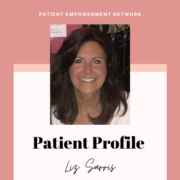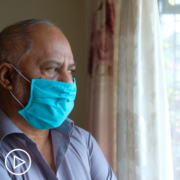Patient Profile: Liz Sarris
Patient Profile
Liz Sarris
Liz Sarris knows the world of healthcare pretty well. Not only has she had a 40-year career as a nurse, but she’s also had a host of chronic illnesses, which means lots and lots of doctor appointments. As if that weren’t enough, Liz has also been diagnosed with cancer three times – with three different and unrelated cancers! “I’m being watched closely from many angles,” she says. “But the great news is I live to tell the story.”
Her cancer story began in 1988. Her primary care doctor found some unexplained blood in her urine and, unable to dismiss it, referred Liz to a urologist. A scope of her bladder revealed a tumor that was about the size of a pea. Fortunately, it was non-invasive, had not invaded the bladder lining, and was removed. No treatment was required, but she did have to be monitored regularly. For the first two years she was checked every three months, then every six months for the next several years. After that she graduated to annual checkups that continue to this day.
Fast forward to 2014 when she was diagnosed with chronic lymphocytic leukemia (CLL). This time, Liz was seeing an endocrinologist for a thyroid issue when the doctor noticed some abnormalities in her blood work. Further testing led to her CLL diagnosis, which, so far, hasn’t required any medications or treatments other than quarterly check ins. “It is a watchful waiting situation,” she explains.
Then in 2017 things took a turn. Liz’s gastroenterologist, who she sees regularly for two chronic gastrointestinal issues, said that there was a spot on her scans that needed to be checked out. It was a spot they had been watching, but now it was starting to change. The spot turned out to be a neuroendocrine tumor of her pancreas. It was a slow growing tumor and not aggressive, but it was malignant and had to be removed, and there was a chance that it was a lot worse than the doctor thought it was. It meant major surgery that was not at all routine, and because her tumor was in the middle of her pancreas, it was possible that she might lose part of her pancreas and her spleen. Liz wanted the best possible outcome from the surgery, which meant keeping as much of her pancreas as possible, so she started to search for a surgeon. “I wanted to see the right people who were specific to this type of cancer and who do neuroendocrine tumors every day,” she says. “If he’s going to poke around my pancreas, I want to know he’s doing 10, 12, 15 of these surgeries a month.”
First, Liz narrowed her search geographically. She lives in an area that is relatively close to several high-quality medical facilities, and she knew that she didn’t want to be too far away from her family and support system after such a big surgery. Then she started asking questions and doing research. “Because I had engaged myself with good local physicians, I reached out to them for referrals,” she says. She asked her doctors who they would send their wives to and who they themselves would go to. Then she started calling surgeons and made appointments to interview three of them. When she had it narrowed to the surgeon she felt best about, she visited him a second time. “I don’t know if it’s the nurse in me or just who I am,” says Liz about her research process. She says that the doctor she chose made her feel confident, and his approach was more hopeful because he was willing to perform the surgery using a rare technique that meant he would remove the tumor from the center and then reconnect the two sides of her pancreas. Her doctor was upfront with her about all the possible risks and made sure she knew that his plan could change if the surgery revealed a different situation than they were expecting. “Do whatever you have to do to give me the best chance at a healthy life,” she told him and added that she hired him to do the job he would do for his mother, his sister, or his daughter and that she didn’t want to see him again in five years.
Her eight-hour surgery was a success. The tumor was removed, and her pancreas was put back together in what Liz describes as a “creative way.” After her surgery she didn’t require any treatment other than regular monitoring, and so far, all her scans have been good. She credits her successful outcomes in part to having a supportive family, good insurance, and good doctors, but she didn’t have good doctors by accident. She’s very proactive in her own healthcare. “I had the recipe for a good situation, but that doesn’t mean I didn’t have to do the research,” she says.
Her background as a nurse helped her know what questions to ask, but she wants others to know they can ask the same questions and can be just as informed. “You can navigate your care more than you think you can,” she says. “You really have to utilize your resources.” Liz says resources like the Patient Empowerment Network, where patients have access to free online tools such as a checklist of questions to ask the doctor, are great for cancer patients. “There needs to be more empowering,” she says. “Much of what I’ve done my entire career is try to empower patients.” She says that being empowered means being educated, identifying your expectations, and asking questions. “We are willing to ask questions of our auto mechanics about our car’s maintenance and repair, but not of our doctors about our own bodies,” she says.
These days Liz is adjusting her expectations for her own life. In March, Covid-19 interrupted the career she’s been so passionate about when her oncologist told her it wasn’t safe for her to continue to work during the pandemic. “This is not how I anticipated retiring,” she says. With her unique perspective as experienced patient and medical professional, she has a lot of knowledge to share, so now Liz is exploring how she can continue to help other patients learn more about how to navigate the healthcare system and take charge of their own care plans. She’s empowered to empower others.
Read more patient stories here.
Jennifer Lessinger is a professional writer and editor who learned the value of patient empowerment during her struggle with a hard-to-diagnose and complex endocrine disorder.










